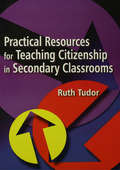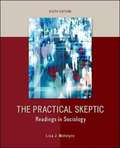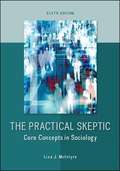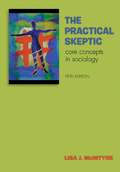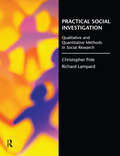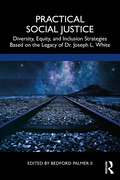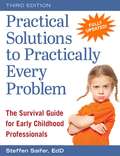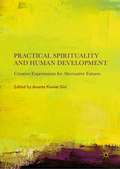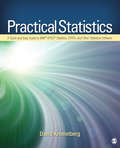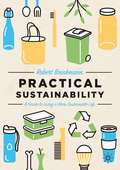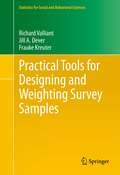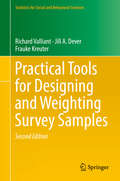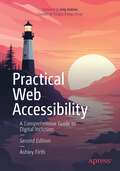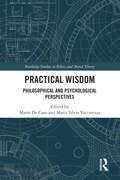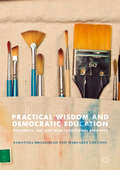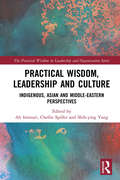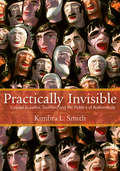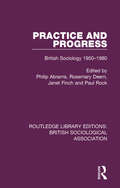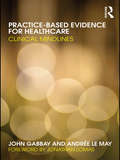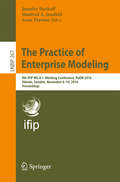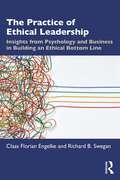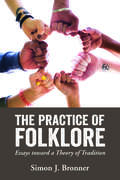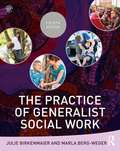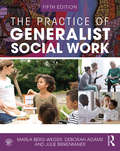- Table View
- List View
Practical Resources for Teaching Citizenship in Secondary Classrooms
by Ruth TudorBased on the New Curriculum for Citizenship, this book provides practitioners in secondary schools with the essential tools needed to teach citizenship. The authors provide an overview of the citizenship order and give guidance on how to fulfill its three main elements: social and moral responsibility, community involvement and political literacy. The book focuses on curriculum developments, teaching, learning and assessment issues and includes a rationale for planning schemes of work in citizenship for the whole school. It also includes lesson plans, teaching ideas and resources, and step-by-step guidance on assessment. Emphasis is placed on including all pupils and references are made to cross-curricular links with other subjects.
The Practical Skeptic: Readings In Sociology
by Lisa McintyreThe Practical Skeptic: Readings in Sociology includes classic sociological research writings as well as recent pieces on fascinating topics of interest to students. It is the ideal companion to McIntyre's text, The Practical Skeptic: Core Concepts in Sociology, or other sociology texts. Readings in this edition challenge students to re-evaluate familiar social arenas: the college classroom, televised sports shows, restaurants, doctors' offices and even public restrooms. The readings focus around the essential message that there is much that goes on in the social world that escapes the sociologically untrained eye.
The Practical Skeptic: Core Concepts in Sociology (Sixth Edition)
by Lisa J. McintyreThe Practical Skeptic, a concise introduction to sociology, focuses on core concepts as the central building blocks for understanding sociology.
The Practical Skeptic: Core Concepts in Sociology (5th Edition)
by Lisa J. McintyreThe Practical Skeptic, a concise introduction to sociology, focuses on core concepts as the central building blocks for understanding sociology. Lisa McIntyre's straightforward, lively, even humorous style and her emphasis on critical thinking make this an engaging and user-friendly text for students of all levels. Through this conversational narrative, students are able to grasp key sociological concepts and learn the essential lesson that there is much that goes on in the social world that escapes the sociologically untrained eye.
Practical Social Investigation: Qualitative and Quantitative Methods in Social Research
by Richard Lampard Christopher PolePractical Social Investigation provides, within a single text, an introduction to a wide range of both long-standing and newer social research methods. Its balanced and integrated coverage of qualitative and quantitative approaches demonstrates that they can be complementary. While research practice is emphasised, readers are encouraged to reflect on methodological issues as well as being provided with tools for their own research.This coherent, accessibly written book draws upon the authors' extensive experience of conducting research and teaching research methods. Numerous examples, based on real research studies, illustrate key issues in a way that acknowledges both the messiness and the creativity of social research.
Practical Social Justice: Diversity, Equity, and Inclusion Strategies Based on the Legacy of Dr. Joseph L. White
by Bedford Palmer IIPractical Social Justice brings together the mentorship experiences of a diverse group of leaders across business, academia, and the public sector. They relay the lessons they learned from Dr. Joseph L. White through personal narratives, providing a critical analysis of their experience, and share their best practices and recommendations for those who want to truly live up to their potential as leaders and mentors. As one of the founding members of the Association of Black Psychologists, the Equal Opportunity Program, and the ‘Freedom Train’ this book focuses on celebrating Dr. White’s legacy, and translating real world experience in promoting social justice change. Experiential narratives from contributors offer a framework for both the mentee and the mentor, and readers will learn how to develop people and infrastructure strategically to build a sustainable legacy of social justice change. They will be presented with ways to pragmatically focus social justice efforts, favoring results over ego. This is a unique and highly accessible book that will be useful across disciplines and generations, in which the authors illustrate how to build relationships, inspire buy-in, and develop mutually beneficial partnerships that move people and systems towards a more equitable, inclusive, and just future. Providing a personal guide to developing an infrastructure for institutional change, Practical Social Justice is based on over half a century of triumph, translated through the lenses of leaders who have used these lessons to measurable and repeatable success. This book will be essential reading for undergraduate and graduate students in the fields of Psychology, Social Work, Ethnic Studies, Sociology, Public Policy, Leadership, Communications, Business, and Educational Administration. It is also important reading for professionals including leaders and policy makers in organisations dealing with issues around diversity, equity, and inclusion, and anyone interested in promoting social justice.
Practical Solutions to Practically Every Problem: The Survival Guide for Early Childhood Professionals
by Steffen SaiferAn encyclopedic how-to guide for the universal early childhood program problems.Practical Solutions to Practically Every Problem attempts to provide solutions to every possible problem faced by early childhood teachers-before teachers encounter them. This classic resource has been updated to focus on current issues faced by educators, including teaching twenty-first century life skills, technology, and cultural responsiveness. This easy-to-use guide gives you quick practical help, now!Educators will save time and energy with over eight hundred solutions to two hundred problems, including:Daily dilemmas and classroom issuesPartnering with families to raise happy childrenDealing with problematic behaviors from co-workersLearning to take care of yourself to prevent burn-outSteffen Saifer, EdD, a former early childhood teacher and Head Start director and trainer, is currently an international consultant and writer based in Spain. He has worked on projects for the Open Society Foundation, The World Bank, and UNICEF, in many countries including Bangladesh, Russia, and Zimbabwe. Dr. Saifer works with programs on culturally responsive curriculum development and implementation and with universities to develop graduate programs for ECD teachers, administrators, and leaders. When in the United States, Saifer resides in Portland, Oregon
Practical Spirituality and Human Development: Creative Experiments for Alternative Futures
by Ananta Kumar GiriThis book explores varieties of spiritual movements and alternative experiments for the generation of beauty, dignity and dialogue in a world where the rise of the religious in politics and the public sphere is often accompanied by violence. It examines how spirituality can contribute to human development, social transformations and planetary realizations, urging us to treat each other, and our planet, with evolutionary care and respect. Trans-disciplinary and trans-paradigmatic to its very core, this text opens new pathways of practical spirituality and humanistic action for both scholarship and discourse and offers an invaluable companion for scholars across religious studies, cultural studies and development studies.
Practical Statistics: A Quick and Easy Guide to IBM® SPSS® Statistics, STATA, and Other Statistical Software
by David KremelbergMaking statistics—and statistical software—accessible and rewarding This book provides readers with step-by-step guidance on running a wide variety of statistical analyses in IBM® SPSS® Statistics, Stata, and other programs. Author David Kremelberg begins his user-friendly text by covering charts and graphs through regression, time-series analysis, and factor analysis. He provides a background of the method, then explains how to run these tests in IBM SPSS and Stata. He then progresses to more advanced kinds of statistics such as HLM and SEM, where he describes the tests and explains how to run these tests in their appropriate software including HLM and AMOS. This is an invaluable guide for upper-level undergraduate and graduate students across the social and behavioral sciences who need assistance in understanding the various statistical packages.
Practical Sustainability: A Guide to a More Sustainable Life
by Robert BrinkmannThis book will teach you everything you need to know about sustainable living—from reducing your greenhouse gas footprint to making sure that you are part of the green economy. Along the way, readers will learn about the field of sustainability and the “three E’s” of sustainable living—environment, economy, and equity. We are in the midst of great environmental change and all of us need to do everything we can to try to live more gently on the planet. Robert Brinkmann provides a range of options for readers as to what they can do to try to make a difference. Some involve simple lifestyle changes - but he also challenges all of us to commit to make more difficult and more meaningful changes to create a greener, more sustainable world. The book also delves into how we can create more sustainable communities, schools, and organizations. It showcases many examples of people and organizations that are making significant contributions to improving our planet’s sustainability that serve as inspiration and guidance for all of us trying to live more sustainably.
Practical Tools for Designing and Weighting Survey Samples
by Jill A. Dever Frauke Kreuter Richard ValliantSurvey sampling is fundamentally an applied field. The goal in this book is to put an array of tools at the fingertips of practitioners by explaining approaches long used by survey statisticians, illustrating how existing software can be used to solve survey problems, and developing some specialized software where needed. This book serves at least three audiences: (1) Students seeking a more in-depth understanding of applied sampling either through a second semester-long course or by way of a supplementary reference; (2) Survey statisticians searching for practical guidance on how to apply concepts learned in theoretical or applied sampling courses; and (3) Social scientists and other survey practitioners who desire insight into the statistical thinking and steps taken to design, select, and weight random survey samples. Several survey data sets are used to illustrate how to design samples, to make estimates from complex surveys for use in optimizing the sample allocation, and to calculate weights. Realistic survey projects are used to demonstrate the challenges and provide a context for the solutions. The book covers several topics that either are not included or are dealt with in a limited way in other texts. These areas include: sample size computations for multistage designs; power calculations related to surveys; mathematical programming for sample allocation in a multi-criteria optimization setting; nuts and bolts of area probability sampling; multiphase designs; quality control of survey operations; and statistical software for survey sampling and estimation. An associated R package, PracTools, contains a number of specialized functions for sample size and other calculations. The data sets used in the book are also available in PracTools, so that the reader may replicate the examples or perform further analyses.
Practical Tools for Designing and Weighting Survey Samples (Statistics For Social And Behavioral Sciences Ser. #51)
by Frauke Kreuter Jill A. Dever Richard ValliantThe goal of this book is to put an array of tools at the fingertips of students, practitioners, and researchers by explaining approaches long used by survey statisticians, illustrating how existing software can be used to solve survey problems, and developing some specialized software where needed. This volume serves at least three audiences: (1) students of applied sampling techniques; 2) practicing survey statisticians applying concepts learned in theoretical or applied sampling courses; and (3) social scientists and other survey practitioners who design, select, and weight survey samples. The text thoroughly covers fundamental aspects of survey sampling, such as sample size calculation (with examples for both single- and multi-stage sample design) and weight computation, accompanied by software examples to facilitate implementation. Features include step-by-step instructions for calculating survey weights, extensive real-world examples and applications, and representative programming code in R, SAS, and other packages. Since the publication of the first edition in 2013, there have been important developments in making inferences from nonprobability samples, in address-based sampling (ABS), and in the application of machine learning techniques for survey estimation. New to this revised and expanded edition: • Details on new functions in the PracTools package • Additional machine learning methods to form weighting classes • New coverage of nonlinear optimization algorithms for sample allocation • Reflecting effects of multiple weighting steps (nonresponse and calibration) on standard errors • A new chapter on nonprobability sampling • Additional examples, exercises, and updated references throughout Richard Valliant, PhD, is Research Professor Emeritus at the Institute for Social Research at the University of Michigan and at the Joint Program in Survey Methodology at the University of Maryland. He is a Fellow of the American Statistical Association, an elected member of the International Statistical Institute, and has been an Associate Editor of the Journal of the American Statistical Association, Journal of Official Statistics, and Survey Methodology. Jill A. Dever, PhD, is Senior Research Statistician at RTI International in Washington, DC. She is a Fellow of the American Statistical Association, Associate Editor for Survey Methodology and the Journal of Official Statistics, and an Assistant Research Professor in the Joint Program in Survey Methodology at the University of Maryland. She has served on several panels for the National Academy of Sciences and as a task force member for the American Association of Public Opinion Research’s report on nonprobability sampling. Frauke Kreuter, PhD, is Professor and Director of the Joint Program in Survey Methodology at the University of Maryland, Professor of Statistics and Methodology at the University of Mannheim, and Head of the Statistical Methods Research Department at the Institute for Employment Research (IAB) in Nürnberg, Germany. She is a Fellow of the American Statistical Association and has been Associate Editor of the Journal of the Royal Statistical Society, Journal of Official Statistics, Sociological Methods and Research, Survey Research Methods, Public Opinion Quarterly, American Sociological Review, and the Stata Journal. She is founder of the International Program for Survey and Data Science and co-founder of the Coleridge Initiative.
Practical UX Design
by Scott FaranelloA foundational yet practical approach to UX that delivers more creative, collaborative, holistic, and mature design solutions, regardless of your background or experience About This Book * Improve your UX design awareness and skills * Gain greater confidence to know when you have delivered a "good" UX design * Learn by example using a book designed by a UX mind for a UX mind Who This Book Is For This book is written for the beginner as well as the experienced UX practitioner, regardless of team size, company size, or job title. It is also intended for anyone with an interest in UX, engages with UX, is involved in any way in interactive problem solving and design, or simply wants to learn more about what we do, how we do it, and why those in the UX field are so passionate about wanting to do it better. What You Will Learn * Awaken your UX mind and dispel the myths of non-UX thinkers * Create the six optimal conditions for your best ideas to appear * Identify and incorporate the ten design principles found in all good UX design * Develop a broader understanding of Information Architecture (IA) to better engage, guide, and inform * Develop a fundamental understanding of patterns and the properties that create them * Raise your level of UX maturity with a strategy that transforms your approach to problem solving and helps others understand the true value of your work * Utilize important tools of the UX trade that never go out of style * Increase your knowledge of UX, incorporate valuable ideas and insights into your work, and look at design from a very unique perspective In Detail Written in an easy-to-read style, this book provides real-world examples, a historical perspective, and a holistic approach to design that will ground you in the fundamental essentials of interactive design, allow you to make more informed design decisions, and increase your understanding of UX in order to reach the highest levels of UX maturity. As you will see, UX is more than just delighting customers and users. It is also about thinking like a UX practitioner, making time for creativity, recognizing good design when you see it, understanding Information Architecture as more than just organizing and labeling websites, using design patterns to influence user behavior and decision making, approaching UX from a business perspective, transforming your client's and company's fundamental understanding of UX and its true value, and so much more. This book is an invaluable resource of knowledge, perspective, and inspiration for those seeking to become better UX designers, increase their confidence, become more mature design leaders, and deliver solutions that provide measurable value to stakeholders, customers, and users regardless of project type, size, and delivery method. Style and approach An in-depth, easy to read, and entertaining journey into and through the world of UX using real-world examples, thoughtful illustrations, and engaging quotes to inspire and explain fully the how and why of UX in a practical and impactful way and used immediately in your own work.
Practical Web Accessibility: A Comprehensive Guide to Digital Inclusion
by Ashley FirthEveryone deserves to use the Internet. An estimated 1.3 billion people experience significant disability. That’s 16percent of the world’s population, or one in six of us. At the same time, over 96 percent of the one million most popular websites have an accessibility issue. Add to this the massive rise in legal cases around sites not being accessible, including Beyoncé, Disney, and Netflix, and you have an important topic that more and more people are starting to engage with.In this updated and revamped second edition of the Amazon technology chart-topping Practical Web Accessibility, you’ll be guided through a broad range of disabilities and access needs. You’ll understand the ways these users typically engage with the web, the barriers they often face, and practical advice on how your websites and content can be compliant, but more than that, inclusive and enjoyable to use. There’s also a new chapter on “Outsourcing Accessibility,” exploring third party “bolt-on” tools, “build your own website” platforms like Wix, and popular design systems. You‘ll explore whether they’re helpful or detrimental in the fight to make the web more accessible.Throughout this book you’ll learn to test for, spot, and fix web accessibility issues for a wide range of physical and mental impairments. Featuring content from the latest compliance frameworks, including the newly released WCAG 2.2 and exploratory concepts in WCAG 3, you’ll see how to go beyond the basic requirements in order to help your users. You’ll also learn that an accessible approach won’t just help people with disabilities, it will improve your website for everyone.This book comes complete with practical examples you can use in your own sites, along with a brand-new approach to auditing and improving a website’s accessibility, and a team’s approach to it, based on tools created by the author and refined over years as a consultant — The FAIR framework and ACCESS checklist. With these tools, you can set up processes for yourself and your team that will drastically improve the accessibility of your sites and, importantly, keep them that way in the future. Suitable for those of any profession or experience level, Practical Web Accessibility gives you all the information you need to ensure that your sites are truly accessible for the modern, inclusive web. If you would like to learn about web accessibility in a clear and actionable way, this book is for you.What You Will LearnA greater understanding of a vast range of disabilities that have online access needs, and the issues they typically face accessing content online.Ways to apply the practical steps required to cater for those needs.How to take your sites, and colleagues, on a journey from being inaccessible to accessible.The importance of accessibility in your designs, code, content, and more.The best ways to test andimprove your sites, so you can be compliant, and truly accessible. Who This Book Is For Anyone, regardless of what they do, who wants to learn how to make websites and their content more accessible for those with disabilities. In the world of web, the book has been used by front and backend developers, designers, product and project managers, team and business leaders.
Practical Wisdom: Philosophical and Psychological Perspectives (Routledge Studies in Ethics and Moral Theory)
by Mario De Caro; Maria Silvia VaccarezzaFeaturing original essays from leading scholars in philosophy and psychology, this volume investigates and rethinks the role of practical wisdom in light of the most recent developments in virtue theory and moral, social and developmental psychology. The concept of phronesis has long held a prominent place in the development of Aristotelian virtue ethics and moral education. However, the nature and development of phronesis is still in need of investigation, especially because of the new insights that in recent years have come from both philosophy and science. The essays in this volume contribute to the debate about practical wisdom by elucidating its role in empirical psychology and advancing important new research questions. They address various topics related to practical wisdom and its development, including honesty, ecocentric phronesis, social cognitive theory, practical wisdom in limited-information contexts, Whole Trait Theory, skill models, the reciprocity of virtue, and challenges from situationism. Practical Wisdom will interest researchers and advanced students working in virtue ethics, moral psychology, and moral education.
Practical Wisdom and Democratic Education: Phronesis, Art And Non-traditional Students
by Margaret Gregson Samantha BroadheadThis book explores the development of practical wisdom, or phronesis, within the stories of four mature students studying for degrees in art and design. Through an analysis informed by the ideas of Basil Bernstein and Aristotle, the authors propose that phronesis – or the ability to deliberate well – should be an intrinsic part of a democratic education. As a number of vocational and academic disciplines require deliberation and the ability to draw on knowledge, character and experience, it is essential that no student feels their experience puts them at a disadvantage. The authors argue that democratic education should allow each participant to feel enhanced, included and able to participate in order to create a constructive and reciprocal dialogue. This work will be of value to students and scholars interested in democratic education, the experiences of non-traditional students, and the sociology of education.
Practical Wisdom, Leadership and Culture: Indigenous, Asian and Middle-Eastern Perspectives (The Practical Wisdom in Leadership and Organization Series)
by Ali IntezariDespite the growing attention towards the importance of practical wisdom in business today, little research has been done about the concept of practical wisdom in the Indigenous, Asian and Middle-Eastern traditions. Contemporary studies of wisdom are dominated by the philosophical traditions of Western thought, which is based on the ancient Greek concepts of wisdom. Much less is known about how practical wisdom, as illuminated by these other traditions, can be implemented in today’s organizational settings. This book thus fills an important gap in understanding wisdom and how it is applied in a poly-cultural world. Wisdom is culturally bound. Wisdom is poly-cultural and interweaves individuality and communality. Practical wisdom is inextricably connected to many needs of contemporary personal and professional life. Moreover, the increasingly growing poly-culturality around the world requires a better understanding of how practical wisdom is understood in different cultures and traditions. Accordingly, there is a need for a) poly-cultural understanding of the concept of wisdom and b) the role of practical wisdom in a world crying out for wisdom. This book underlines the importance of developing a poly-cultural and interdisciplinary understanding of the concept of practical wisdom in today’s complex environment. The book offers significant insight into the implications of the non-Western traditions of wisdom and how such an understanding of the non-Western traditions can help us better and more critically understand and appropriately address new multi-faceted complex emerging phenomena. While the Western traditions offer valuable insight into the implication of wisdom in modern life, an integrated view that brings together the Western and non-Western traditions can provide a more critical and practical insight into how to apply practical wisdom in a contemporary poly-cultural environment.
Practically Invisible: Coastal Ecuador, Tourism, and the Politics of Authenticity
by Kimbra Smith<p>The community of Agua Blanca, deep within the Machalilla National Park on the coast of Ecuador, found itself facing the twenty-first century with a choice: embrace a booming tourist industry eager to experience a preconceived notion of indigeneity, or risk losing a battle against the encroaching forces of capitalism and development. The facts spoke for themselves, however, as tourism dollars became the most significant source of income in the community. <p>Thus came a nearly inevitable shock, as the daily rhythms of life--rising before dawn to prepare for a long day of maintaining livestock and crops; returning for a late lunch and siesta; joining in a game of soccer followed by dinner in the evening--transformed forever in favor of a new tourist industry and the compromises required to support it. As <i>Practically Invisible</i> demonstrates, for Agua Blancans, becoming a supposedly "authentic" version of their own indigenous selves required performing their culture for outsiders, thus becoming these performances within the minds of these visitors. <p>At the heart of this story, then, is a delicate balancing act between tradition and survival, a performance experienced by countless indigenous groups.</p>
Practice and Progress: British Sociology 1950-1980 (Routledge Library Editions: British Sociological Association #1)
by Philip Abrams, Rosemary Deem, Janet Finch and Paul RockOriginally published in 1981 Practice and Progress is a collection examining the changes that have occurred in the theories, methodologies and practices of sociology, in the institutional and educational setting of the subject, and in British society. The themes pursued include the professionalization of sociology its development and standing in the universities; the impact on it of Marxism and feminism and the major debates over positivism and empiricism, quantitative methods, linguistic analysis; and numerous other crucial methodological and theoretical concerns.
Practice-based Evidence for Healthcare: Clinical Mindlines
by John Gabbay Andrée le MayThis book challenges the evidence-based practice movement to re-think its assumptions. Firmly rooted in real practice while drawing lucidly on a great breadth of theoretical frameworks, it examines afresh how clinicians use knowledge. Evidence-based practice has recently become a key part of the training of all health professionals. Yet despite its ‘gold-standard’ status, it is faltering because too much effort has gone into insisting on an idealised model of how clinicians ought to use the best evidence, while not enough has been done to understand why they so often don’t. Practice-based Evidence for Healthcare is a groundbreaking attempt to redress that imbalance. Examining how clinicians actually develop and use clinical knowledge day-to-day, the authors conclude that they use ‘mindlines’– internalised, collectively reinforced, tacit guidelines. Mindlines embody the composite and flexible knowledge that clinicians need in practice. They are built up during training and continually updated from a wide range of formal and informal sources. Before new evidence becomes part of practitioners’ mindlines, it is transformed by their interactions with colleagues and patients via their communities of practice and networks of trusted colleagues. To explore how mindlines work Gabbay and le May draw on a wide range of disciplines to analyse their detailed observations of clinical practice in the UK and the US. Their conclusions and provocative recommendations will be of value to all practitioners, health service managers, policymakers, researchers, educators and students involved in the promotion of evidence-based practice.
The Practice of Enterprise Modeling
by Jennifer Horkoff Manfred A. Jeusfeld Anne PerssonEnterprise modeling (EM) has gained substantial popularity both in the academic community and among practitioners. A variety of EM methods, approaches, and tools are developed and offered on the market. In practice they are used for various p- poses such as business strategy development, process restructuring, as well as business and IT architecture alignment and governance. PoEM 2008, the First IFIP WG 8. 1 Working Conference on The Practice of Ent- prise Modeling, took place in Stockholm, Sweden. It is the first conference aiming to establish a dedicated forum where the use of EM in practice is addressed by bringing together researchers, users, and practitioners. The goals of PoEM 2008 were to - velop a better understanding of the practice of EM, to contribute to improved EM practice, as well as to share knowledge and experiences. The theme of PoEM 2008 was EM in different application contexts, e. g. , software development, including agile development, as well as business development, gove- ance, and change.
The Practice of Ethical Leadership: Insights from Psychology and Business in Building an Ethical Bottom Line
by Claas Florian Engelke Richard B. SweganThis book considers ethics as a practical discipline at the heart of decisions, reasoning, shaping, and ordering organizations. Both engaging and accessible, it offers effective suggestions for selecting and developing ethical leaders and invites readers to self-reflect and understand how to build ethical cultures within their organizations and beyond.Examining the many characteristics of ethical leadership, including love and authenticity, the book uses factual evidence to explore both its positive and negative characteristics. It offers readers an in-depth insight into how ethical decision making can help determine the right thing to do, supported by directly applicable ethical lessons that help leaders become more conscious going forward. The authors provide concrete suggestions for action, as well as ways to develop and understand what is needed to become an ethical leader. Each chapter encourages readers to reflect on their own experiences, as well as engage in discussion with others, and challenge basic assumptions. The book concludes by offering a long-term oriented outlook at future challenges for ethical leaders.Rooted in extensive psychological, philosophical, entrepreneurial, and business experience, The Practice of Ethical Leadership will appeal to leaders, human resource professionals, and Board members across a wide variety of organizations. This book will also benefit academics as well as anyone who is invested in the fields of leadership, management, business, and industrial-organizational Psychology.
The Practice of Folklore: Essays toward a Theory of Tradition
by Simon J. BronnerWinner of the 2020 Chicago Folklore PrizeCHOICE Outstanding Academic Title for 2020Despite predictions that commercial mass culture would displace customs of the past, traditions firmly abound, often characterized as folklore. In The Practice of Folklore: Essays toward a Theory of Tradition, author Simon J. Bronner works with theories of cultural practice to explain the social and psychological need for tradition in everyday life. Bronner proposes a distinctive “praxic” perspective that will answer the pressing philosophical as well as psychological question of why people enjoy repeating themselves. The significance of the keyword practice, he asserts, is the embodiment of a tension between repetition and variation in human behavior. Thinking with practice, particularly in a digital world, forces redefinitions of folklore and a reorientation toward interpreting everyday life. More than performance or enactment in social theory, practice connects localized culture with the vernacular idea that “this is the way we do things around here.” Practice refers to the way those things are analyzed as part of, rather than apart from, theory, thus inviting the study of studying. “The way we do things” invokes the social basis of “doing” in practice as cultural and instrumental. Building on previous studies of tradition in relation to creativity, Bronner presents an overview of practice theory and the ways it might be used in folklore and folklife studies. Demonstrating the application of this theory in folkloristic studies, Bronner offers four provocative case studies of psychocultural meanings that arise from traditional frames of action and address issues of our times: referring to the boogieman; connecting “wild child” beliefs to school shootings; deciphering the offensive chants of sports fans; and explicating male bravado in bawdy singing. Turning his analysis to the analysts of tradition, Bronner uses practice theory to evaluate the agenda of folklorists in shaping perceptions of tradition-centered “folk societies” such as the Amish. He further unpacks the culturally based rationale of public folklore programming. He interprets the evolving idea of folk museums in a digital world and assesses how the folklorists' terms and actions affect how people think about tradition.
The Practice of Generalist Social Work: Chapters 8-13 (New Directions In Social Work Ser.)
by Marla Berg-Weger Julie BirkenmaierThe fourth edition of The Practice of Generalist Social Work continues to teach students to apply micro, macro, and mezzo social work skills. This new edition strengthens the connection between the three levels of practice and is fully updated to the 2015 EPAS. This edition also contains more illustrations of theory and more context for deciding which type of intervention is a good fit. Most chapters now open with a case study and continually refer back to the case to provide additional connections between theory and real-life practice. Each chapter also incorporates a link to a Grand Challenge of Social Work from the American Academy of Social Work and Social Welfare, which shows the connection between social work and the most significant societal challenges of today. The Quick Guides within the text offer students guidance for their field experience and practice after graduation. The text also comes with a rich companion website that includes support materials and six unique cases that encourage students to learn by doing. Go to www.routledgesw.com to explore the cases and additional resources.
The Practice of Generalist Social Work
by Marla Berg-Weger Julie Birkenmaier Deborah AdamsThe fifth edition of The Practice of Generalist Social Work expands its foundational and integrative coverage of social work values, ethics, competencies, and behaviors as they relate and function within diverse practice settings. Through a strengths-based perspective, students are given a comprehensive overview of the major skills and considerations for practice with individuals, families, groups, communities, and organizations, encompassing planned change, engagement, assessment, intervention, evaluation, termination, and follow-up. In response to the challenges and realities of professional practice, chapters in this new edition open with a case which is integrated to provide connections between the book’s content and real-life practice settings. Each chapter builds on the knowledge gained from previous chapters and provides expanded resources that contain up-to-date guidance for the beginning practitioner. These include: Consistent and in-depth use of key theoretical perspectives and case examples to demonstrate essential knowledge, values, and skills for generalist social work practice. Grand Challenges from the American Academy of Social Work and Social Welfare, which illustrate the connection between social work and the most significant contemporary challenges in our society. A clear focus on generalist social work practice, informed by the authors’ decades of real-world practice experience, at all levels of engagement and intervention. This edition also offers revised and expanded student and instructor resources, which are available at www.routledgesw.com, including new conceptually-based companion readings, access to six unique and interactive case simulations, quick guides for improved fieldwork, and annotated weblinks for further reading, listening, and viewing. Combining comprehensive and current resources in traditional and online formats, the new edition of The Practice of Generalist Social Work facilitates a dynamic, experiential introduction to social work.
